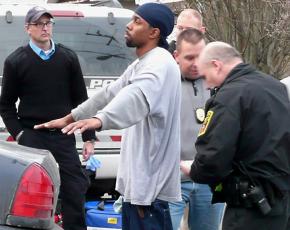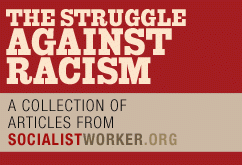When racism is the law
The actions of vigilantes like George Zimmerman aren't an exception--because racism is woven into the fabric of a system based on inequality and injustice.
WHEN GEORGE Zimmerman stalked Trayvon Martin because the African American teenager looked "suspicious," it was racist vigilantism, pure and simple. Even conservative politicians and pundits have been forced to concede that Zimmerman was wrong to single out Trayvon for no other reason than his hoodie and the color of his skin.
But every day, in state after state and city after city, the same racist vigilantism takes place, and it's perfectly legal and officially sanctioned--because the perpetrators are representatives of the American criminal injustice system.
Under the "stop and frisk" policy in New York City, hundreds and hundreds of police officers do each day what George Zimmerman did when he saw Trayvon Martin. They're under orders to target young men of color.
From the harassment and violence of police, to a prosecutor's decision about who gets charged, to the judges passing sentence based on the politicians' tough-on-crime laws, to the use of the ultimate punishment of death--at every stage, the U.S. criminal justice system is a machine that disproportionately victimizes African Americans and other people of color.

The statistical evidence of racial discrimination is so overwhelming that you'd think it must be against the law. But racism is the law.
Author Michelle Alexander compares the U.S. justice system, with its systematic targeting of African Americans, to the laws that existed to preserve racial segregation in the U.S. South before the civil rights movement. We live in an era, she writes, of "the new Jim Crow."
Alexander is right--and it's worth remembering in this context the role that segregation played in upholding the system of exploitation in the South that benefited a tiny elite. As the abolitionist Frederick Douglass wrote a century and a half ago, the rulers of the South maintained their power over "both the poor whites and the Blacks by putting enmity between them. They divided both to conquer each."
Racism is not just tolerated in the law, but it's an indispensable part of capitalism. It is one of the most important ways that one section of the working class is kept down, economically, socially and politically--and that the working class as a whole is kept divided, rather than united against its common enemies.
That's why it won't be enough for one vigilante in Florida to be held accountable--if he ever is. The new civil rights movement that has arisen in the wake of Trayvon Martin's murder must challenge the institutional racism at the core of U.S. society.
RACISM INFECTS the U.S. "justice" system from start to finish.
There's the question of who gets arrested and who doesn't--something that was thrown into sharp relief by the Trayvon Martin case.
Even though it was immediately clear to police that Zimmerman had killed an unarmed teenager, he wasn't charged with any crime--because a racist law protected him. Florida's "Stand Your Ground" self-defense law allows someone to use deadly force if they "reasonably believe" they are being threatened with death or serious injury.
After the law went into effect, the number of homicides in Florida ruled "justifiable" jumped, from eight in 2004 to 40 in 2010. Among those "justifiable" homicides: Last January, a Miami homeowner chased an alleged burglar from his home for more than a block and then stabbed him to death. That same month, a retired sheriff's deputy in Miami Lakes shot and wounded an unarmed homeless man for "threatening" his family in a Haagen-Dazs shop--but wasn't charged because of "Stand Your Ground."
Zimmerman claims Trayvon was beating him before he pulled out his gun and fired--though the evidence that this is a lie is becoming overwhelming. But what if the situation were reversed? What if an African American teen from out of town claimed he was attacked by a neighborhood watch volunteer, and shot him in self-defense? Does anyone believe that the police would refuse to arrest Trayvon Martin because of the "Stand Your Ground" law?
The truth is that what George Zimmerman did in singling out Trayvon takes place every day in cities around the country.
For example, the NYPD isn't supposed to racially profile. But the statistics show its practice of "stop, question and frisk" does exactly that. According to the Center for Constitutional Rights, out of the 576,394 people stopped under the policy in 2009, 84 percent were Black or Latino. Together, African Americans and Latinos account for around half of New York City's population.
This policy of legalized harassment and abuse is getting worse. In 2011, more than 684,000 people were stopped in New York City, 87 percent of them Black and Latino.
Police across the country behave in similar fashion, as the many notorious examples of African Americans targeted for the crime of Driving (or Walking or Standing or Living) While Black prove. An ACLU report on racial profiling documented many examples--including in Illinois, where a drug interdiction program called "Operation Valkyrie" singled out Latino motorists for about 30 percent of stops, even though Latinos are just 8 percent of the state's population and are less likely to have drug contraband than whites.
Examples of discrimination in drug enforcement underline the racist character of the "war on drugs" in its entirety. The drug war was launched under Republican Richard Nixon and kicked into high gear by Ronald Reagan, but with the support of Democrats at each step.
Racial profiling was central to the campaign to "get tough on drugs." For example, "The Common Characteristics of Drug Couriers" issued to police by the Florida Department of Highway Safety and Motor Vehicles in 1985 warned troopers to be suspicious of drivers wearing "lots of gold" or who don't "fit the vehicle," and "ethnic groups associated with the drug trade."
In terms of stopping the use of illegal drugs, the war on drugs has been a dismal failure. But it has been a massive success in filling up American prisons. The U.S. incarcerates 2.3 million people, more than any country in the world, in percentage terms or absolute numbers.
African Americans are the overwhelming casualties of this war. According to the Sentencing Project, though Blacks comprise 13 percent of the population and around 14 percent of drug users, they account for 37 percent of drug arrests.
This racism continues in the courtroom, of course. Blacks are far more likely than whites to face a felony charge, to be represented by a typically overworked public defender and to get a longer sentence. Blacks are also more likely to be excluded from juries.
Of course, some victims of the biased American injustice system don't even get a chance to walk into a courtroom. They are the hundreds of victims of police killings every year, where a badge and a gun grant officers the right to be judge, jury and executioner. The numbers are hard to be sure of, because though careful records are kept of how many police officers die each year, record-keeping of how many people police kill is less careful.
A 2007 investigation by ColorLines and the Chicago Reporter found that "about 9,500 people nationally were killed by police during the years 1980 to 2005--an average of nearly one fatal shooting per day." The report also showed that "African Americans were overrepresented among police shooting victims in every city the publications investigated."
When the people who are supposed to be upholding the law can kill and brutalize Black people with impunity, is it any wonder that a racist vigilante like Zimmerman feels he can do the same?
RACISM IS the law of the land in so many other respects. It's true in the voting booths--voter ID laws requiring people to present a photo identification at polling places has translated into lower African American turnouts. It's true in the classroom, where Black middle-schoolers were nearly three times as likely to be suspended as their white counterparts.
African Americans aren't the only victims of racist laws. In the era of the U.S. government's "war on terror," racial profiling and harassment by law enforcement has become an ordinary occurrence for Arabs and Muslims. Laws infringing on civil liberties that once would have been considered unconstitutional by mainstream political opinion are now supported by Democratic and Republican politicians alike.
And Latino immigrants are bearing the brunt of a different racist hysteria. Laws that invite racial profiling--like Arizona's SB 1070, which authorized law enforcement to stop, detain and arrest anyone that officers had a "reasonable suspicion" was undocumented--have sent a wave of fear into immigrant communities.
SB 1070 has been held up in the courts, but it inspired copycats, such as Alabama's HB 56, whose initial provisions not only empowered police to act as immigration agents, but criminalized anyone who rented to or employed suspected undocumented people.
When you look at this overall picture, the truth is obvious: "American justice" is a contradiction in terms.
Every inch of U.S. society is propped up by institutions that are racist and discriminatory to the core. Those in power depend on the suspicion and distrust that racism breeds to distract attention from the real purveyors of violence and the corporations that actually steal jobs by shutting down factories.
But the massive reaction to Trayvon Martin's murder and the huge demonstrations against racism in recent weeks have shown that there's an antidote to suspicion: solidarity. Tens of thousands have raised their voices in protest around the country--because they look like Trayvon or they know someone who looks like Trayvon, and because they see how a system that promotes bigotry and hate has to be challenged.



